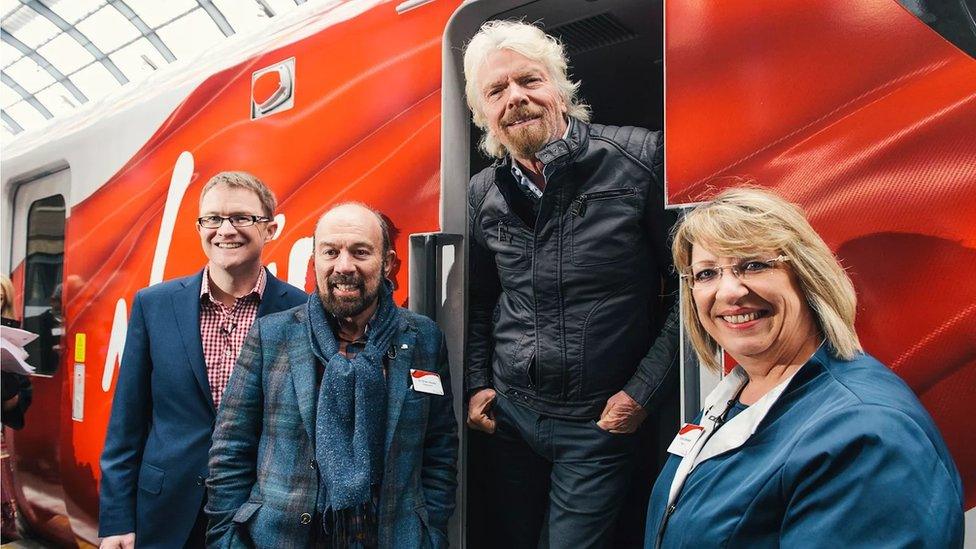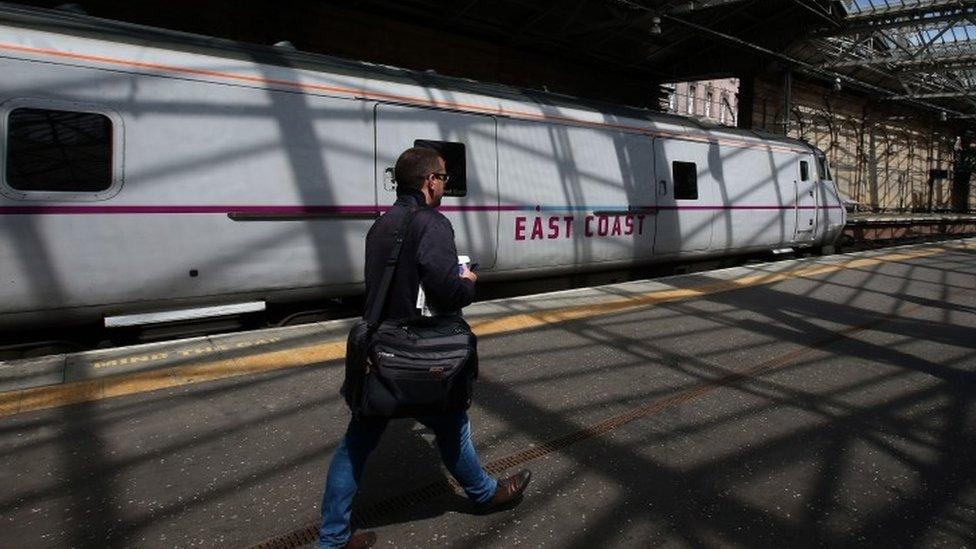Why has East Coast Mainline hit the buffers again?
- Published

Sir Richard Branson and team on East Coast
For the third time in just over a decade the government has called a halt to the East Coast Main Line rail franchise.
Transport Secretary Chris Grayling says it will be run by his department until 2020 after which it will be in the hands of a public-private partnership.
So what led to the decision to ditch the current franchise arrangement?
How was it meant to work?
The London to Edinburgh line had been run by a joint venture between Stagecoach, which owns 90% of the franchise, and Virgin, which owns 10% since 2015.
The firms agreed to pay £3.3bn for the right to run the line, to be paid in instalments over the course of the franchise until 2023.
In return for paying those premiums, Stagecoach and Virgin operated trains on the line which runs from London's Kings Cross station, up through Peterborough and passes through York and Newcastle on its way to Edinburgh.
What went wrong?
Three years into its eight-year franchise, Virgin and Stagecoach made it clear the arrangement was unsustainable: they weren't making enough money.
The government says the firms were over-optimistic about an expected increase in passenger numbers when they made their initial bid.
The firms themselves and Sir Richard Branson, boss of Virgin in particular, said the two companies had been promised a huge upgrade of the tracks by Network Rail, which would have improved reliability and allowed more services to run, carrying more passengers.
Sir Richard said delays to the upgrade had "torpedoed" the assumptions behind the original bid.
In February Mr Grayling said the franchise would be replaced with an alternative arrangement and began looking at options.
Who loses out?
On the face of it, the government will lose the remaining £2.3bn of the £3.3bn promised by the franchise. However, the amount it will lose or gain ultimately will depend on what sort of money the replacement service can generate.

The East Coast mainline was government-run until Stagecoach and Virgin's bid
Because Stagecoach and Virgin are escaping some of their scheduled payments, critics said halting the franchise early amounted to "a bail-out" by the taxpayer of the private sector operators.
Both the firms and the government reject that suggestion.
Stagecoach and Virgin Trains have lost in the region of £200m to keep up their franchise payments. Although the line is profitable, it isn't bringing in enough revenues to cover those commitments.
Mr Grayling said Stagecoach and Virgin, as well as the financial losses, had suffered reputational damage. But he added they wouldn't be excluded from bidding to run other parts of the network in future.
What happens now?
For two years the line will be state-run, by an operator of last resort, set up and overseen by the department of transport but involving private sector firms including engineering firm Arup.
Passengers and staff shouldn't see any disruption to day-to-day services, according to the transport secretary.
After 2020 the aim is that there will be much closer cooperation between state-owned Network Rail, which owns the track infrastructure, and whoever is operating the train service.
The East Coast Mainline, which is being renamed London and North Eastern Railway (LNER), a brand that has been resurrected from the 1940s, will then be run by a public-private partnership.
Why do I have a sense of deja vu?
This is the third franchise on this route to run into trouble.
In 2005, GNER signed a £1.35bn, 10-year deal in what was then the biggest contract in European railway history. One year later it was stripped of the route.
In August 2007, National Express agreed a £1.4bn deal, but then handed it back to the government in 2009 against the particularly challenging background of the financial crisis.
It was then government-run until Stagecoach and Virgin's £3.3bn bid in 2015.

What would you like to know about the future of East Coast Mainline rail franchise? Let us know and a selection of your questions will be answered by a BBC journalist.
Use this form to ask your question:
If you are reading this page on the BBC News app, you will need to visit the mobile version of the BBC website to submit your question on this topic.